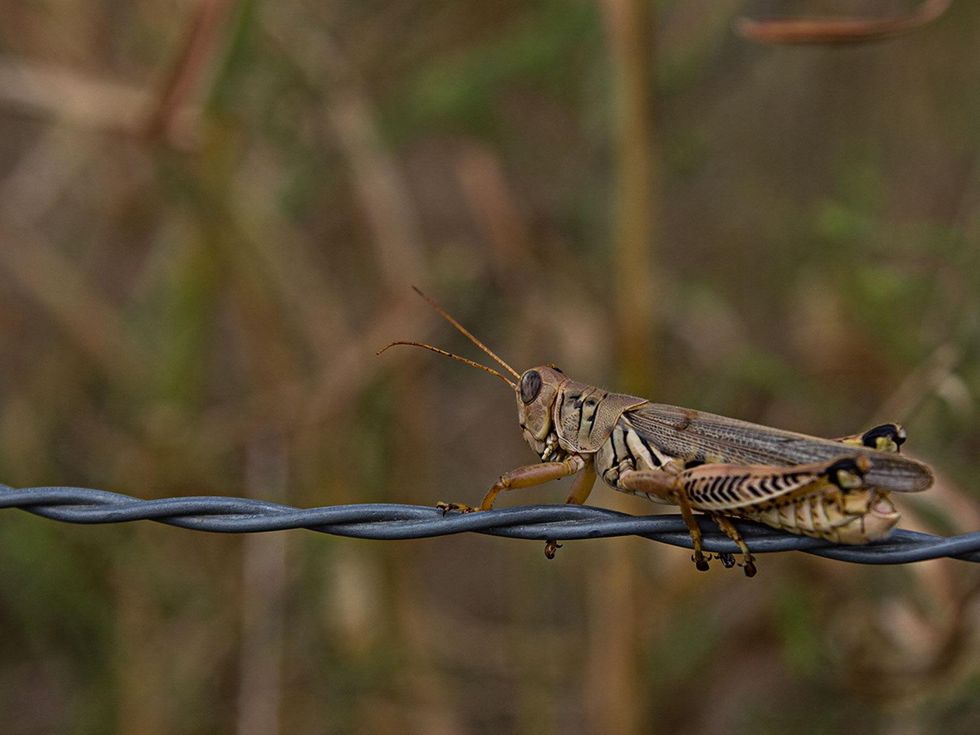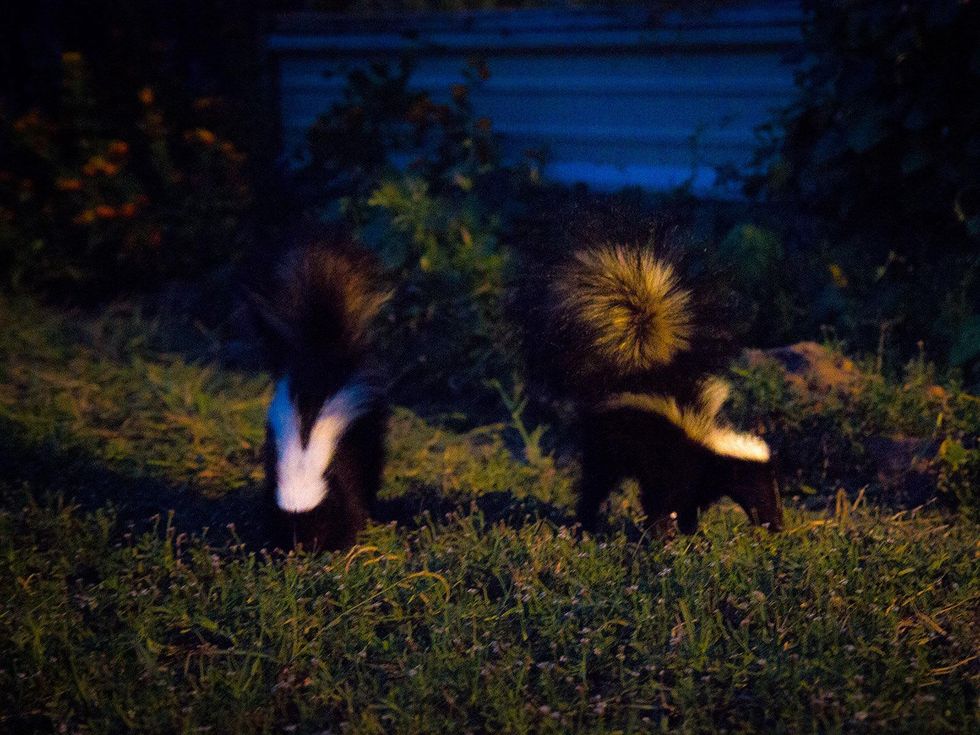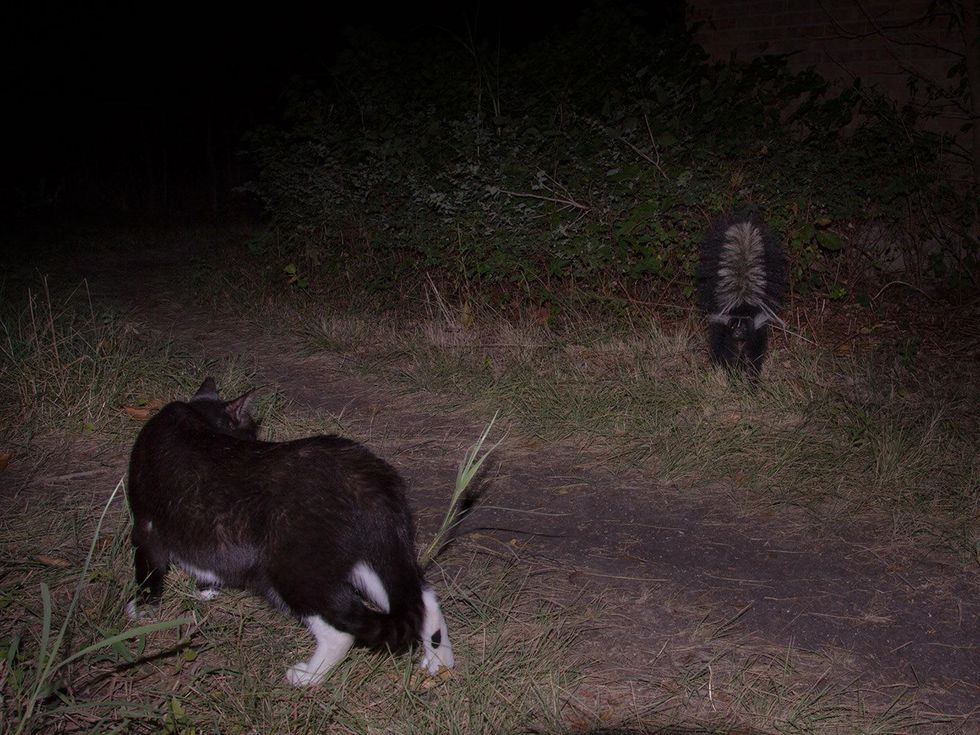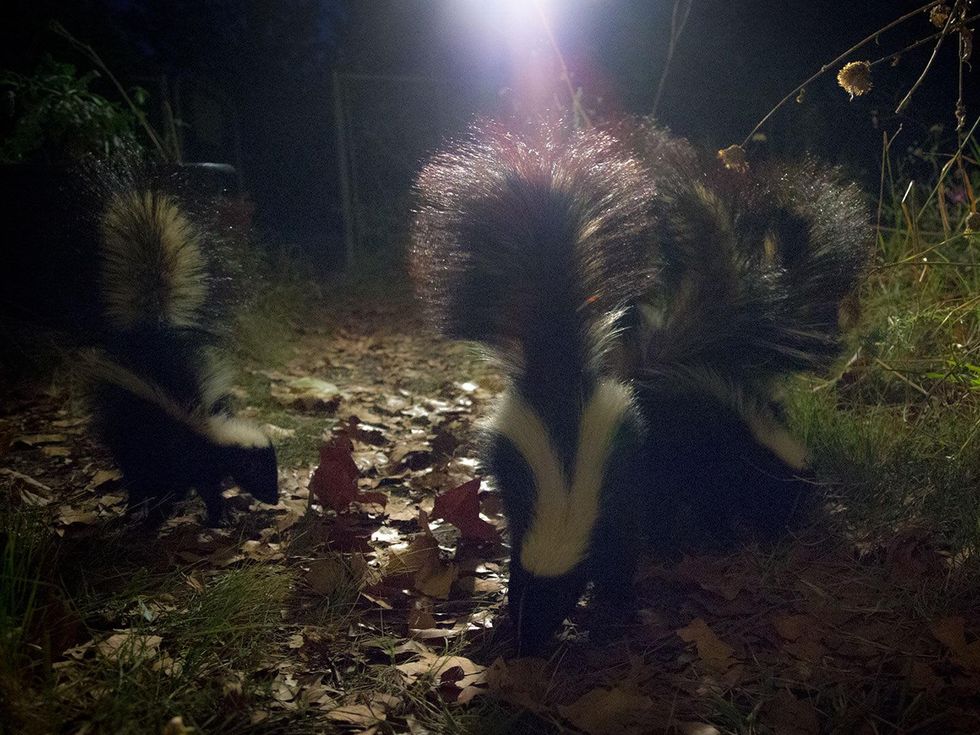The Farmer Diaries
Like good garden neighbors, skunks earn their keep on Texas farm
I am now living among several dozen skunks since I spotted the first settlers under the debris of a dilapidated barn last July. A census is not easily taken of these aloof, indigenous tribes, but gauging by my accidental encounters with them, I believe that I have become acquainted with at least 30 skunks, maybe even as many as 50, in a 10-acre area.
Having such close contact with the skunk population, I've been learning much about them. I've grown to love them and admire their characteristics.
All my life, I've heard that any skunk seen in the daytime is likely rabid, because skunks are nocturnal creatures who only come out at night. It's a common notion, and many people I know shoot skunks on sight if they see one while even a hint of sunlight glows on the horizon after sunset.
If skunks are nocturnal creatures that should only come out at night, someone needs to inform the skunks. They do what they want, whenever they want to do it.
As with many tenets of common knowledge, this notion is untrue. I often spot skunks out and about in the middle of the day. Like humans, they look for food when they're hungry, and if hunger pangs strike at noon on a hot, summer day, then it's at noon on a hot, summer day that they're going to hit their favorite eating spots to scare up some grub.
In one daytime sighting, around 2 pm, I saw a family of four babies with their mother in front of our farm building, scavenging for cat food that had been tossed out after a finicky cat deemed it below his standards. In other sightings, I've come across pairs of adults roaming in the middle of a field about two hours before sunset or hitting the garden to look for bugs while the sun clearly cast their shadows on the ground.
If skunks are nocturnal creatures that should only come out at night, someone needs to inform the skunks. They do what they want to do, whenever they want to do it. The only way that they can be described as nocturnal is that they become even more active at night.
What's more, skunks exhibit a sense of fairness. In my duties gardening and tending the crops in the field, I often unintentionally surprise one skunk or another. One might expect that I'd have been hit with their defensive odor many times in the last couple of months. I have not — not even once. The skunks show amazing restraint in how they deal with potential threats, even though firing off a few rounds would really cost them nothing.
I've often startled them from no more than three feet away, and each skunk reacts by facing me, raising his tail high and stomping the ground with his hand, making a thud like when an overly dramatic politician hits a podium for emphasis. The skunk body language says, "Get back!" They seem confident that their reputation for spraying their odor is all that it takes to intimidate a suspected aggressor.
When I don't back down but stand still, a skunk usually lowers his tail and raises it again while repeating the thud, just in case I missed the first round. I can't turn away at this point, regardless of the potential outcome, as their inconsequential threats fix me where I stand, as I try not to laugh out loud from all the cuteness. Seeing that I will not be turned away, they almost always lower their tail, turn cautiously to the side and run for it.
This stand-off has repeated itself more times than I can count, so the skunks have started dropping their charade, ignoring me when our chores bring us to the same spot. One night as I watered some landscaping plants under a work light in my backyard, several young skunks wandered in among the plants to look for bugs.
Endeared by their antics and code of conduct, I've found skunks to be worthy neighbors in their own right.
I continued my watering; they ambled, wrestled each other over beetles they spotted and sniffed around for more. They paid no attention to me except to watch me for a second or two every once in a while as I made a loud noise or stepped near them. Most of the time, they were close enough to pet.
Then, in an instant, something caused them to vacate their eating spot. Moments later, I saw a procession of seven adults walking slowly through a gate in single file to take their children's spots at the leafy dining hall. The baby skunks stayed close by, but they searched for food on the outskirts of the adults, much like kids at the children's table on Thanksgiving.
I watched them all for about half an hour. Every few minutes, one or another became curious about me and walked over to sniff me. Occasionally, they'd go through the motions of the stand-off, but their heart just wasn't in it like it was before. It's clear to me they have decided to simply let me be; I'm not hurting anything anyway.
Skunk courtesy, I've found, extends not only to humans, but also to other species. My five cats — three of whom are black and white, just like the skunks — have had no incidents with the skunks to date.
The cats ignore the skunks mostly. Occasionally, however, a skunk will be led by his nose in the direction of a reclining cat. Its approach incites the cat to get up and move out of the way with an aggravated hiss.
There's no fear in the cat's expression, just annoyance at having to endure these musky neighbors. Most of the time, neither the skunks nor the cats even acknowledge each other's presence.
There is one exception to this live-and-let-live policy of the skunks. Once I got too close to some very small skunk babies; they were the size of hamsters. Their mother chased me back with fury, hissing, stomping her feet and growling like a badger. That wasn't the wild in her, just the mother.
I had learned skunks were good at keeping slowly crawling bugs at bay. Turns out these garden helpers are also crazy about the all-time greatest threat to any crop.
Endeared by their antics and code of conduct, I've found skunks to be worthy neighbors in their own right.
One night under the work light, a juvenile skunk entered the backyard in pursuit of something. Skunk eyesight, as I've come to find, is terribly myopic; their nose is how they truly see the world.
Junior sniffed here and there to get back on the trail of whatever it was he was chasing, stumbling in the tall grass as anyone would wearing the equivalent of six winter coats worth of fur. Then, with the agility of a cat, he pounced on his prey.
A grasshopper jumped up from his hands, and the skunk went right back to tracking his prey. In another pounce, he caught it and started crunching away. Finished with the first grasshopper, he went back to sniffing, and moments later scared up a second.
I had learned skunks were good at keeping slowly crawling bugs at bay. Turns out these garden helpers are also crazy about the all-time greatest threat to any crop. A single grasshopper can take down a large swath of sprouts. Two can eat a cornstalk to the ground.
Urban dwellers may think farmers are telling tall tales when they speak of the destructive power of grasshoppers, but anyone who's watched them devastate entire fields of crops along with every tree, bush and blade of grass nearby knows that grasshoppers are not merely a pest; they are a threat to a farmer's livelihood — even the food supply — if they get out of hand.
Yet here was my skunk friend doing his share of integrated pest management. I only saw him eat two grasshoppers before I unintentionally startled him away. I'm sure it takes a dozen or more to fill him up each evening.
Multiple that bounty by the 30 to 50 skunks I speculate are living on the land and roving through the crops every night in search of insects, and then multiply that number by seven days, and the weekly skunk contribution to pest control on the farm becomes impressive. I had noticed that the grasshopper problem seemed smaller this year despite the continuing Texas drought that creates ideal conditions for the pests.
The fact that skunks are collaborators in grasshopper control makes them an asset to the farmer, worth far more than endless orders of chemical insecticides from the local farm supply. I'm convinced that to know a skunk is to love a skunk. Misunderstood and maligned as a nuisance species, skunks in fact are complex, full of character, and offer enormous value to us humans in exchange for just being left alone.




